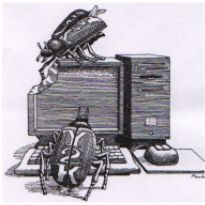|
 A year ago in a radio interview, I said the Y2K was
hyped up. I repeat that
now. Listening to the Y2K
paranoia, I sometimes wonder if I live on a different planet.
I grant that there are problems, but they are not the ones the
press is talking about. It’s
not computers, but the price of public hysteria. A year ago in a radio interview, I said the Y2K was
hyped up. I repeat that
now. Listening to the Y2K
paranoia, I sometimes wonder if I live on a different planet.
I grant that there are problems, but they are not the ones the
press is talking about. It’s
not computers, but the price of public hysteria.
I rather think that human beings like to worry.
It is a hobby they have that has helped them protect themselves
from the forest lions. Those
who did not worry tended to die. So
us survivors are wired to bite our nails.
In a democracy, the government is supposed to
reflect the people. So, it
is no surprise that much of the hype comes from the government.
My local library sports a glossy brochure from the Governor’s
Office entitled “Y2K–What2Do.”
There, I learned that “thousands of computers and countless
computer chips have the potential to malfunction.”
Included is a checklist of the “basic supplies” we cannot do
without: plastic utensils,
extra eyeglasses, heavy gloves and a loud bell or whistle.
I was tempted to call the Governor’s office to ask whether he
thought a bell or whistle would be better.
The brochure also advises us all to “have some
extra cash on hand in case computer-controlled electronic
transactions… cannot be processed.”
One problem leads to another.
The Federal Reserve has already printed up an additional $70
billion in cash–about $700 per U.S. household. Clearly, some people will want $700, but I have a hard time
visualizing the average household doing that.
Recently, Singapore Airlines added their name to the
list of those that will not fly at midnight, on that dreaded night.
I think that’s a good idea, not because of a flight risk, but
because it’s a bum rap to be caught in the air on New Year’s Eve
anyway. Last month on a
flight, I ended up sitting next to a 747 pilot for a major airline who
is also a senior trainer. He
confided to me that he thinks New Year 2000 will be the safest time to
fly. His view is that air traffic controllers are under trained,
and give a false sense of security.
If their computers went down, so much the better.
The airlines have to make a showing for public image; perhaps the
government and the banks too.
With all the gloom, many forget the great
opportunity that Y2K has been. All
over the world, manufacturers are kicking out inventory to accommodate
distribution stockpiles. Armies
of programmers and consultants shifted gears to accommodate the new Y2K
industry, reprogramming or replacing whole computer systems.
Y2K trade shows have sprung up selling everything from
freeze-dried chicken soup to Franklin wood burning stoves.
And don’t forget the printers that printed up the Governor’s
glossy brochure advising me to get a whistle or a bell.
The problem with Y2K is comparable with, in some
ways, the Northridge Earthquake. The
emergency rooms were packed with the wounded, but ironically 90% of them
were injured not from the earthquake itself, but from the panic to avoid
it: running in the dark
into open doors, and tripping over chairs.
In Y2K, there is indeed a problem, but it is more related to the
hysteria than to the reality. Government,
banks and airlines all add to the stampede, stepping over each other to
show that they are the most ready.
The public likes that.
As for me, I like backpacking. Come January, I’m headed to the eBay.com to buy as much
auctioned backpacking food as I can.
The Armageddon crowd has been stocking up, and many will be
unloading their inventory in a few weeks.
What a once-in-a-millennium opportunity.
-- William Knoke is an
internationally recognized futurist and author of “Bold
New World: The Essential
Road Map to the 21st Century.” |
 "Bringing the Future to Your Industry"
"Bringing the Future to Your Industry"